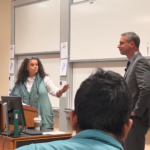A Soldier’s Faith
GLEN COVE, NY — Next month will start the 50th year since I became a soldier. Whether he serves for two years or 40, whether he achieves high rank or not, whatever his branch of service or military skill, the soldier learns something unique about reality that stays with him well beyond 50 years. Often this enhanced appreciation of reality leads to a strong faith in God.
It is said that there are no atheists in fox holes. The first meaning of this is that those in immediate danger of death believe in God. There is a more subtle meaning as well: those with a particularly realistic understanding of authority and human relations are better equipped to understand God’s power.
Consider the Centurion with the sick servant in Chapter 8 of Matthew. When Jesus offered to come cure him the Centurion answered, “Lord, I am not worthy that thou shouldest enter under my roof, but only say the word, and my boy shall be healed. For I also am a man subject to authority, having under me soldiers; and I say to this one go, and he goeth; and to another, come, and he cometh; and to my servant, do this, and he doeth it.” Jesus then said to his followers “Amen, I say to you, I have not found so great faith in Israel.”
A Centurion was something like a company commander, but great faith was also present in those that served under them. In Matthew 27:54, it was not only the Centurion, but also his soldiers, who when they saw the earthquake at the moment of Jesus’ death on the Cross, said, “Indeed this was the Son of God.” They saw reality far better than the biblical scholars who most likely saw the temple veil, after it was torn from top to bottom.
A third centurion, Saint Cornelius, was chosen by God to receive the miraculous vision that would play a major role in settling the controversy about how to receive Gentiles as Christians. (Acts, Chapter 10).
God is the “God of Armies,” He is referred to by that title about 100 times in the Old Testament. Christian liturgy, in the East and the West, Catholic and Protestant, harkens back to Isaiah 6:3. In the Hebrew text this is “Kadosh, Kadosh, Kadosh, YHVH Tsavaot” (Holy, Holy, Holy, God of armies”). It is not read that way. Orally “Adonai”(Lord) is substituted for “YHVH” to avoid taking the name of God in vain.
For the Greek-speaking Jewish contemporaries of Our Lord it was “Hagios, Hagios, Hagios, Kyrios Sabaoth” (“Holy. holy, holy. Lord of armies”).
The liturgical formulae in the Roman Rite, “Sanctus, sanctus, sanctus, Domine Deus sabaoth” simply blends to two ancient texts. “Tsava” is Hebrew for “Army” “Tsavaot” is its plural. “Sabaoth” is the classical transliteration of “Tsavaot.” The Greek version quoted above is regarded as inspired by God in many Eastern churches.
Going back at least to Saint Cornelius, there have been soldier saints. A prominent one is Saint George, who died on April 23, 303. Another is Saint Ignatius Loyola, who chose a military model for the Society of Jesus. Less obvious is the military influence on his prayer life. He returned everything to God is his prayer. This echoes the total obedience and total loyalty that military life sometimes requires.
Today we live in a society in which only a few young men experience any military life at all. It is also a society of decreasing realism in popular thought, of decreasing commitment even to vows, of decreasing self denial, and especially of decreasing firm Faith. It used to be said that many young men grew up during their two or three years in the Armed Forces. Today we have to wonder if they grow up at all.
###
copyright © 2011 by Charles G. Mills and the Fitzgerald Griffin Foundation,www.fgfBooks.com. All rights reserved. This column may be re-posted if credit is given to Charles Mills and fgfBooks.com.
Charles G. Mills is the Judge Advocate or general counsel for the New York State American Legion. He has forty years of experience in many trial and appellate courts and has published articles about the law.




